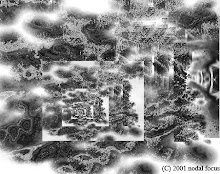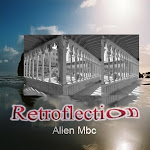In the area of electronic music there are many, many styles and forms ranging from simple and repetitious drum beats to elaborate orchestrations with all kinds of variations in between. Early electronic music was mostly odd noises and manipulated recordings of 'found sounds' and composers such as John Cage went so far as to publish
4' 33" of silence! (four minutes and thirty three seconds.) which helped establish the idea that beauty is in the eye of the beholder or maybe I should say ear...the idea was that the incidental back ground noises were art and by framing this in concert Cage made a major point about sound as art. While John Cage's silence was at one extreme others have made music so dense that there was no break, no dramatic pauses- just a barrage of sound.
Kitaro has made a career out of music that is mainly electronic and it reflects certain Eastern values and displays emotions in the titles and ambience which many find relaxing. Nine Inch Nails has a format that borders on bombastic and assaults the listeners senses as the key idea are pounded out, enhanced electronically and presented with a forceful front singer. Other music acts emply varous amounts of synthesized sounds but many like early Led Zeppelin did not have any reference to synthesizers or manipulated loops yet they played a prominent role in the sound.
Gary Wright's "Dream weaver" is an example of pop music done electronically in the early 1970's and it was very popular and still heard on many stations.
Labeling electronic music styles:
With modern electronic sound tools like synthesizers and samplers, drum machines and effect units or software vocals are often not a feature in music which is purely electronic. Voices mutate into string sounds or drones and words become less of a focus. The very blandness of so called "New Age music" is very popular with certain listeners and just as ignored by many, many more who loath it. I talked with several music store owners and employees and deciding what album belongs to which established style is a major annoyance. Techno? Dance? Hip hop? Ambient? Even the style labeled Ambient is subdivided into many types. I have heard Ambient that is far from my own concept of ambient. Techno while hated by many is pretty much an expansion of 1970s disco with out the exact flourishes that it held. Hip hop artists have credited Kraftwerk with being a major influence. Kraftwerk hits like The AutoBahn showcased sounds made with machines that were very original and the words were often vocoderized.
While the general public in the 1970's demanded pop music that had a standard 3 minute format many turned to longer composistions by Tangerine Dream or progressive rock artists which relied heavily on keyboards. Pop music and electronics began a long term relationship that continues with recent artists in the U.S. The last bastions of conservative music styles such as country music now has electronic additions in the form of keyboards, samples and digitally enhanced vocals and effects.
Why does electronic music hold such fascination for so many?
As a quick look at more recent hits such as the work of Madonna shows, electronics are pretty much the main tool used. She received her award and called the engineers to the stage. Band? No, engineers! Paul Oakenfield and William Orbit are well known in the electronic music world and both worked with Madonna. Orbit's work on "Ray of light" in 1998 is amazing. The listeners in mainstream broadcast mediums do like a 3 minute format but they also enjoy the electronic sounds. The artists probably like having no one onstage to divert attention. In the 1980's Michael Jackson's stage show had a massive electronic arsenal located under the stage and the story went that when hiring the technicians to work there height was of importance as well as ability to move quickly and effectively. One time I was testing out a synthesizer in a large music store at a shopping mall and soon realized that I had at least 35 people crowding in behind me to see what the noise was. I asked the store manager if that happened a lot and he said it actually did, especially when the synth was being manipulated with programmers exploring the capabilities and tonalities the keyboard or module could do. Novelty may be a major factor or perhaps it is simply the curiosity about new sounds that generates interests.
Here to stay!
After the novelty wears off (as it has) the fact remains that electronics are part of music and will remain so for most mainstream hits. Many listeners such as myself prefer a certain style of music based on electronics and more and more artists are beginning to focus on electronic music to the exclusion of most other forms of instrumentation.
This is as a reflection of the technology of our times and the availability of new electronic instruments which have become commercialized and readily available.
Subscribe to:
Post Comments (Atom)
-2001-Nodal.jpg)

No comments:
Post a Comment